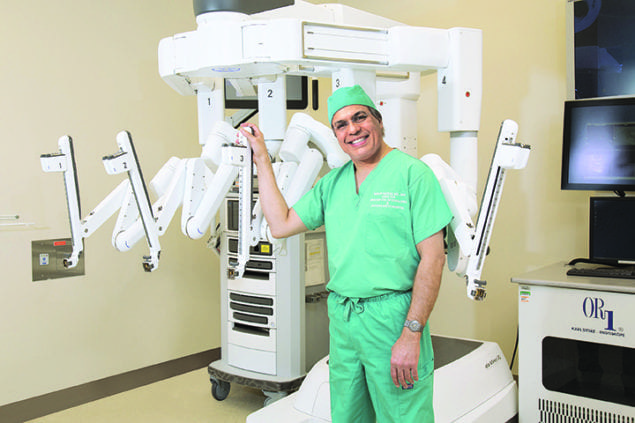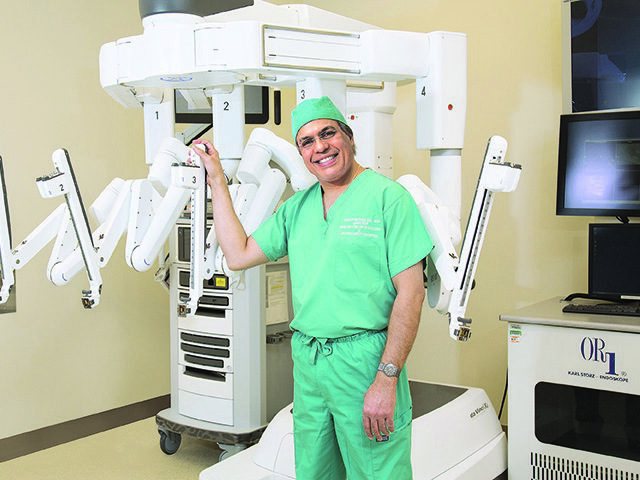
Prostate cancer is the second leading cause of death in men in the U.S. according to the American Cancer Society. In fact, one in seven men will be diagnosed in their lifetime.
Being told you have prostate cancer sometimes creates confusion about which treatment is the most effective. Fortunately, specialists like internationally-renowned urologist Sanjay Razdan, MD, MCh, from Jackson South Community Hospital’s Urology Center of Excellence, can clue you in on what to do following a prostate cancer diagnosis.
What do I do after a diagnosis?
“Patients don’t always have to make a quick decision after diagnosis,” says Dr. Razdan.
In fact, he adds, this is the time when you should do as much research as possible, including knowing what your treatment options are. “Be optimistic, and choose your surgeon or radiation oncologist properly.”
An experienced urologist can give you the proper resources and advice to guide you through this difficult journey. Although there are several treatments available, Dr. Razdan says a robotic prostatectomy should be considered as a viable treatment option.
“With the advent of robotic technology, there’s been a major paradigm shift. Over 90 percent of surgical procedures for prostate cancer in the U.S. are done robotically to great success, especially here at Jackson South, with the assistance of the latest in robotic technology, including the da Vinci Xi robotic surgical system,” Dr. Razdan says.
Other treatment options include radiation, cryotherapy, high intensity focused ultrasound (HIFU), and in some carefully selected cases, just active surveillance of a patient’s prostate specific antigen (PSA). If PSA rises, a repeat biopsy may be performed. But some of these treatment options may carry complications.
“HIFU treatment was recently approved by the Food and Drug Administration for treatment of an enlarged prostate, but not specifically for prostate cancer,” says Dr. Razdan.
Meanwhile, radiation therapy can pose significant side effects, including radiation cystitis, radiation proctitis, or even secondary cancers. On the other hand, radiation therapy does have an important role in selected cases, especially in patients with a locally advanced disease found during a prostatectomy or with a final pathology revealing that some cancer could have been left behind.
“Patients should be aware of the very important fact that if radiation therapy as a primary treatment fails, and prostate cancer recurs or persists in the prostate, then surgical removal becomes an extremely difficult proposition and carries a higher complication rate,” says Dr. Razdan.
The Big Question
The question of whether men will become incontinent or impotent dominates the conversation following diagnosis — and for good reason.
“It’s the meat and potatoes of the discussion,” admits Dr. Razdan. “It’s a very valid concern, especially for younger men.”
This is when having an experienced urologist at your side is vital, because maintaining continence and erectile function are directly dependent on your surgeon.
“At Jackson South, we have close to a 98 percent rate of continence among our robotic prostatectomy patients, and most of them have full control of urination by three to six months,” he says.
As for erectile issues, Dr. Razdan utilizes unique surgical techniques that make his patients feel whole again.
“I pioneered the use of amniotic membrane during robotic prostate surgery,” he says. “I use a small piece of this natural growth stimulant to protect the delicate nerve bundles around the prostate that help a man achieve an erection.”
What’s next?
Men can expect a few lifestyle changes following treatment, with diet being the first thing that is addressed. Dr. Razdan advises his patients to follow regular heart health nutrition guidelines.
“Keep the saturated fats down, reduce excess carbohydrates, and eliminate smoking and drinking,” he says. “Obesity is directly related to an aggressive form of prostate cancer.”
As for recurrence, Dr. Razdan says it’s possible, but it varies depending on treatment and when exactly a patient was diagnosed. However, with early-stage prostate cancer, over 90 percent of his cases, there shouldn’t be a high PSA.
He adds, “I tell my patients to do their research, choose an experienced surgeon, and, most importantly, stay positive.”
To learn more about the Urology Center of Excellence at Jackson South, as well as the use of robotic assisted surgery, call 305-585-4URO or visit JacksonUrology.org.






